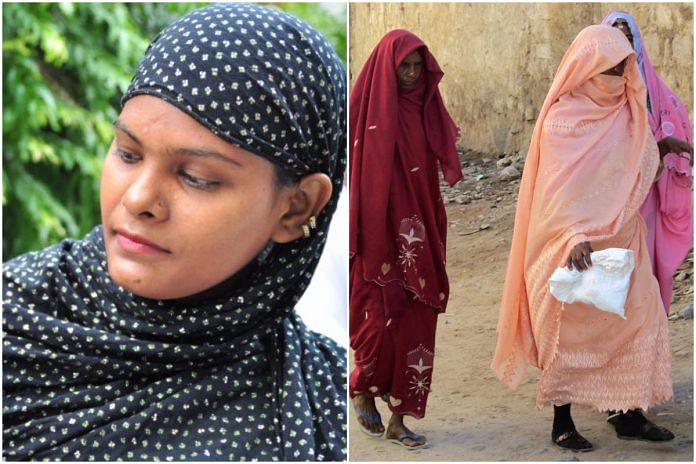Courts in India and Pakistan have been reluctant to grant women their rights. That needs to change.
The media in Pakistan and India is infatuated with populist judgments from the Supreme Courts. The triple talaq judgment of the Indian Supreme Court has received applause and publicity although it is not the first of its kind.
It does give Muslim women relief from arbitrary divorce and opens the door to challenging other oppressive practices within religious traditions, yet the Court’s hesitancy in striking down actions that clearly violate fundamental rights affecting the rights of minority women is quite apparent. The minority view is based on political, rather than legal, considerations.
A portion of the majority judgment has also justified its extinction on religious grounds, rather than on the premise of fundamental rights guaranteed to all citizens under the Indian Constitution. Unfortunately, the timing of this judgment has given a boost to Hindutva nationalism despite the fact that it was Muslim women who consistently fought for their rights even before Partition.
In 1929, when the Indian Legislative Assembly was debating restrictions on child marriage, Muslim men and women supported the law. Muhammad Ali Jinnah, who was at the time a member of the Legislative Assembly, supported the Bill and is quoted to have said, “If my constituency is so backward as to disapprove of a measure like this then I say the clearest duty on my part would be to say to my constituency, ‘you had better ask somebody else to represent you’.”
In 1939, the Dissolution of Muslim Marriages Act was passed because a large number of Muslim women were converting to other religions in order to get out of oppressive marriages. The preamble of the Act itself states that it aims to “remove doubts as to the effect of the renunciation of Islam by a married Muslim woman on her marriage tie.” It was this rising conversion of Muslim women, which persuaded the Ulema to begrudgingly support the Act.
Women’s rights groups, both in India and Pakistan, have often argued that the clergy has never challenged a chauvinistic law which infringes the principles of Sharia. A prime example is the Muslim Personal Law (Shariat) Application Act, 1937 itself where customary law was replaced with Sharia law, except in the case of the inheritance of agricultural property. It suited the British as they wanted to appease the subcontinent’s politically powerful landlords and gave no discomfort to the custodians of Islam, as women were the only sufferers in this case.
In some ways, it is understandable that the Indian Supreme Court has expressed its fear of interfering in the personal law of minorities. They have not forgotten the lessons learnt from the Shah Bano case wherein the Court, in granting a paltry maintenance to a divorced Muslim woman, sparked religious riots. Hindu, Parsi and Christian women in Pakistan have fewer rights than their counterparts in countries where they are in the majority.
Minorities zealously guard their culture and religion, but invariably this is done most zealously where women suffer as a result. Pakistan is a case in point where Islamization was only brought about in the early eighties and, even then, it protected fiscal matters and personal laws of all religions.
As far as fiscal matters are concerned, the debate on usury has carried on in courts for several years but the Supreme Court has sat on a decision of the Federal Shariat Court which Islamized the concept of interest in the banking system. The apex court has hesitated to rule on it, as it fully comprehended the implications of disturbing the fiscal policy of the country.
As far as personal laws of Muslims are concerned, they too have been under challenge but the Muslim Family Laws Ordinance of 1961 has so far been protected by the Constitution from being challenged on the touchstone of fundamental rights. It is a double-edged sword as women cannot achieve the threshold of equality but can at least protect themselves from the abuse of triple talaq, free indulgence in polygamy, and from going through Halala before marrying their former husbands.
The law also allows orphan grandchildren to inherit the property of their pre-deceased parents, which according to the Ulema is un-Islamic. The Ordinance of 1961 does not in any way grant women equal status within the family unit, however, it does protect them from exceptional oppression.
The Indian Constitution is based on secular principles whereas Pakistan is a semi-theocratic State. But their courts have the same approach when it comes to the rights of women who belong to minorities in the country. This is particularly so where a minority is capable of demonstrating its power in a way in which neither the Parliament nor the Supreme Courts of both countries are willing to meet it head-on.
The Shayara Bano case has opened up a deeper debate on the role of the Supreme Courts in protecting the rights of all women regardless of their religious status. Should courts apply fundamental rights according to law or weigh it on political expediencies? Perhaps the judiciaries in both countries will have to reflect upon this question, as women are no longer disempowered and willing to accept charitable crumbs from courts. Instead they are asserting their rights as equal citizens.
Asma Jahangir is the former president Supreme Court Bar Association of Pakistan and honorary Commissioner of international commission of jurists



